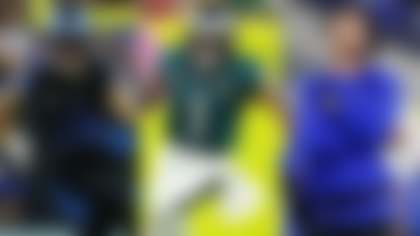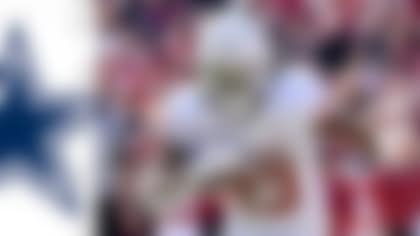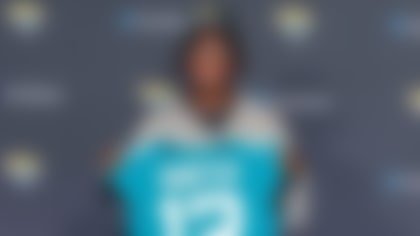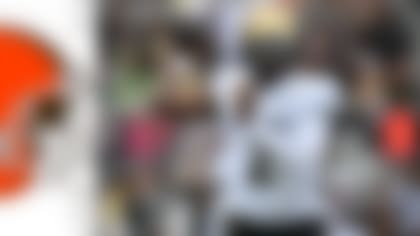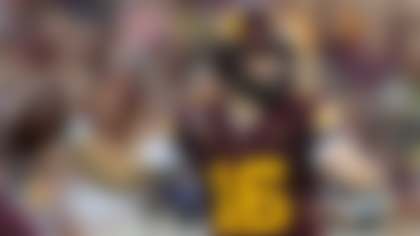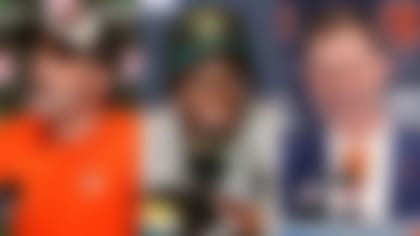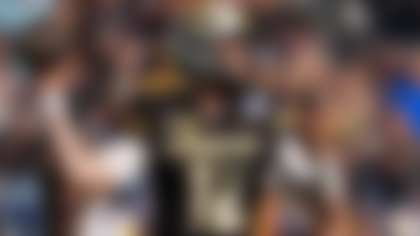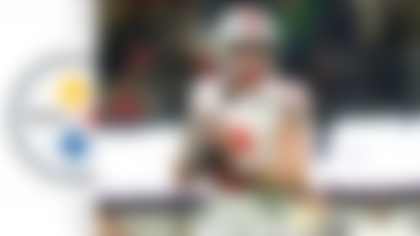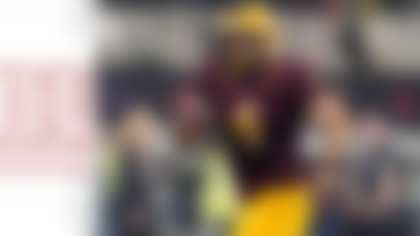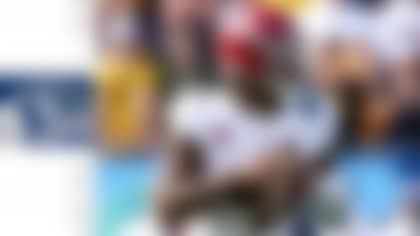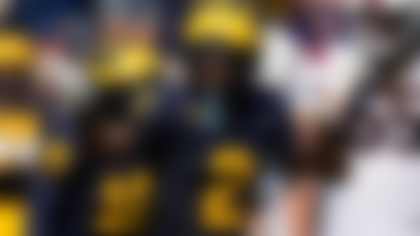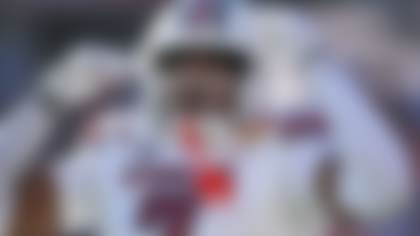Throughout his football career, whether awash in relatively not-so-bright Friday Night Lights or taking his lumps on the sportÔÇÖs grandest stage, Jared Goff has shown a penchant for staying cool in the face of adversity. From getting benched in the Oregon rain during a 1-11 freshman season at Cal to getting subbed out in red-zone situations during a rivalry game to enduring a dismal rookie season with the Los Angeles Rams to falling behind early in a cacophonous road setting in a conference title game, the 26-year-old quarterback has had plenty of experience trying to settle himself in unsettling settings.
And now he has even more: On a surreal Seattle Saturday, in a quiet and mostly empty stadium, Goff silently summoned a hearty supply of resolve while confronting a new challenge.
Twelve days after having three pins surgically implanted into his broken right thumb, and four days after learning that Rams coach Sean McVay planned to start backup ´╗┐John Wolford´╗┐ in Saturday's first-round playoff game against the rival (and NFC West champion) Seahawks, Goff stood on the sideline as L.A.'s Nsimba Webster fielded the opening kickoff feeling frustrated and utterly helpless with his team's season on the line.
He wanted to run out on the field and compete and try to lead his team to victory. The thought of standing and watching unnerved him to the core.
"Yeah, it was extremely hard," Goff recalled Saturday night. "It was one of the hardest things I've had to handle. The week was tough. I knew I had to prepare to be ready to play, in case they needed me. And I'm happy I did."
So are the Rams, whose 30-20 victory at newly renamed Lumen Field was sparked by a punishing defensive performance and the dual-threat excellence of rookie running back Cam Akers -- with the help of a trusted and steady (if not fully healed) hand.
While Goff, after replacing the injured Wolford with 5:19 left in the first quarter, struggled early on and finished with a far-from-prolific stat line, he fought through all of it -- a swarming Seattle defense led by brilliant middle linebacker Bobby Wagner´╗┐, a thumb not quite as flexible as he'd like it to be and a week of preparation during which he'd had exactly zero practice reps against a live defense -- and made big plays when his team needed them most.
Shorter version: Thumbs up, emoji or otherwise.
Two-and-a-half hours after the game, as he and his teammates sat on a plane at Sea-Tac Airport waiting to make the satisfying flight south across the Pacific Coast, Goff conceded to me that while he understood McVay's reasoning for starting Wolford, it was a gut punch to his competitive spirit. And he reflected upon an emotional two-week stretch that tested him more than physically.
Thirteen days earlier, in the same stadium, Goff had broken and dislocated the thumb after banging it on the helmet of Seahawks defensive end Benson Mayowa -- then popped it back into place on the field and finished out a 20-9 defeat that gave Seattle the NFC West crown and put the Rams' postseason hopes into question. He had surgery the next day, and Wolford, in his first ╣˙▓˙═Ô┴¸═°start, played capably in L.A.'s playoff-clinching 18-7 victory over the Arizona Cardinals.
McVay liked what he saw from Wolford, citing his mobility (he ran for 56 yards against the Cardinals) and decision-making, and decided he'd rather give the second-year backup a full week of preparation than live with the uncertainty surrounding Goff's injury.
Said Goff: "Sean made it very clear to me, 'We're obviously not benching you. We need to have a plan moving forward and this week, with where you're at physically and what notÔÇŽ' I got it, to an extent. But it was tough."
Knowing he'd still be active as Wolford's backup, Goff pushed to do as much as he could to prepare for the possibility he'd be summoned into service.
"As a competitor, you want to be out there -- but I prepared accordingly," Goff said. "We were doing almost all I could 'on air' throughout the week, just off to the side. I wasn't taking any reps against the defense, but I was just trying to get my thumb into a good place."
When Wolford, while finishing a short run on the Rams' second drive of a scoreless game, took a shot to the head from star Seahawks safety Jamal Adams -- suffering a neck injury that would land him in a nearby hospital for precautionary reasons (though he was able to return to the stadium and fly home with the team) -- McVay no longer had a choice. Newly signed third quarterback Blake Bortles was inactive, leaving the Rams' fate in Goff's hands. More accurately, his throwing hand, meaning his four healthy fingers and semi-flexible thumb were on the spot.
The early moments were predictably choppy: Goff, on third-and-5 from the Seattle 15, took a seven-yard sack before Matt Gay scored the game's first points on a 40-yard field goal. L.A. went three-and-out on its next two series, with Goff going a combined 0 for 4.
After a 50-yard field goal by Jason Myers tied the game with 10:34 left in the second quarter, Goff, on second-and-7, drifted to his right and sent a deep ball in the direction of wide receiver Cooper Kupp´╗┐. It was a play Goff had discussed with Kupp on the sideline even before Wolford's injury, and sure enough, the receiver was open. The pass, however, floated on Goff, and it looked like it might be intercepted -- until Kupp alertly came back for the ball and made a nice catch despite tight coverage by Adams, resulting in a 44-yard gain and giving the quarterback his first completion.
Was the bum thumb to blame, or just rustiness?
"I don't want to use (the injury) as an excuse," Goff said. "Like, I was out there playing; I'm capable. Yeah, there were limitations, but I'm not gonna sit here and say that I can't make that throw ÔÇŽ or I can't make any of the throws on the field. I can make any throw I want to make. Well, that one in particular, I was trying to get into a rhythm. I was trying to figure it out a little bit with where I was at with my hand and get into a good place, and Cooper made a great play for me and settled me down."
The Rams' defense -- the league's stingiest in terms of points allowed during the regular season -- did its part, too. Led by All-Stratosphere defensive tackle Aaron Donald´╗┐, who had two sacks and three quarterback hurries before leaving with an unspecified injury to his ribs, L.A. harassed Seattle's typically dangerous quarterback, Russell Wilson´╗┐, from start to finish. Most notably, three plays after Gay's 39-yard field goal gave the Rams a 6-3 lead, cornerback Darious Williams jumped a short pass from Wilson (11 for 27, 174 yards, two touchdowns) to second-year standout DK Metcalf and took it 42 yards to the house.
Wilson cut the deficit to 13-10 on the next series, sliding away from pressure and connecting with Metcalf on a 51-yard score -- one of the rare times the Seahawks were able to solve the problems that McVay's first-year defensive coordinator, Brandon Staley, presented them schematically.
Staley, for his part, expressed gratitude for Goff's resilient effort.
"What did we [discuss] a few weeks back?" Staley asked via text, referencing a previous conversation after Goff's bounceback performance in an early December victory over the Cardinals. "[He's] way tougher than anyone knows!"
And more nimble: On a day when Wilson's improvisational brilliance wasn't enough to carry the Seahawks to victory, Goff managed to do a poor man's imitation on one of the game's most pivotal plays. Facing a third-and-9 from his own 26 with 2:55 remaining, Goff -- who before this season told me that throwing on the run is something he has worked hard to turn from weakness to strength -- got outside the pocket, slid toward the right sideline and appeared to be in no man's land. Just before reaching the line of scrimmage, he slipped a quick pass to Akers, who rambled ahead for a 44-yard gain.
"That was a good one," Goff said. "That was third down and we went fast, and Cam Akers is a hell of a player that we like to throw the ball to. And honestly, when I see him in space ÔÇŽ I mean, he's as good as anyone in space. I was able to dump it off to him, and he did the rest. He ran the ball like a madman today."
Two Akers (28 carries, 131 yards) runs later, the Rams had a 20-10 lead they would take into halftime -- and the Seahawks had a problem. Seattle hung around until the game's final five minutes, when Goff, on second-and-4 from the Seahawks' 15, froze the defense with a wicked play fake to running back Malcolm Brown and lofted a pass to wide-open wide receiver Robert Woods´╗┐, who strolled into the end zone for a 30-13 lead.
"Yeah, we've run that play I believe three times this year, and all three of them looked like that," Goff said. "We like that one. It was a play we were kinda just waiting to get to and got the look for and got to it. We'd talked about it throughout the game, hitting that for a touchdown. We knew eventually we'd get the look."
Perhaps, eventually, Goff will get the love some might imagine is befitting a player who has won three career postseason games in his five seasons -- including the 2018 NFC Championship Game triumph over the New Orleans Saints in the Superdome -- and been a steady presence during McVay's highly successful four-year stint as head coach and offensive guru. For now, he sure gets a lot of grief, be it from analytics nerds or fans on social media or Hall of Fame quarterbacks appearing on the pregame show and game broadcast of his most recent playoff victory. His stat line on Saturday (9 for 19, 155 yards, one TD), when he became the first quarterback since Tom Brady four seasons ago to complete fewer than 50 percent of his passes and win a playoff game, was another superficial strike against him.
To many FOX viewers, the favored narrative at the start of Saturday's game seemed to be that McVay had chosen Wolford because he liked the young player's decisiveness and that it alleviated some of the pressure "to be perfect" (color commentator Troy Aikman's term) in his play calls. That's a whole other argument, for another day, but know this: While Goff is adept at blocking out the noise and focusing on the task at hand -- namely, finding a way to win -- he'd surely relish the chance to lay waste to that line of thinking in a conspicuous and emphatic fashion.
Knowing, as Saturday's game began, that he wouldn't have an opportunity to do that for his team ate him up inside -- even as he understood intellectually that when professing his readiness to McVay there was an element of attempting to will the healing into existence, as most competitors are prone to do, and that the coach had to do what he had to do.
Now, presumably with an opportunity to face presumptive (three-time) MVP and fellow Cal alum Aaron Rodgers at Lambeau Field or six-time Super Bowl winner (including a victory over Goff two years ago) Brady and the Buccaneers in Tampa Bay next weekend, he's hoping to get to a better place in the days that follow.
"Yeah, I think I will, [with] reps and just time," Goff said. "Again, I had surgery 12 days ago, and every day it gets better. I'm just against a clock at this point. Last Monday or Tuesday it felt a certain way, and today it felt better and tomorrow it will feel even better. It just continues to feel better every day.
"Where that gets me to on [Saturday or] Sunday, I don't know. But I know it'll be good enough to win."
Follow on Twitter.

